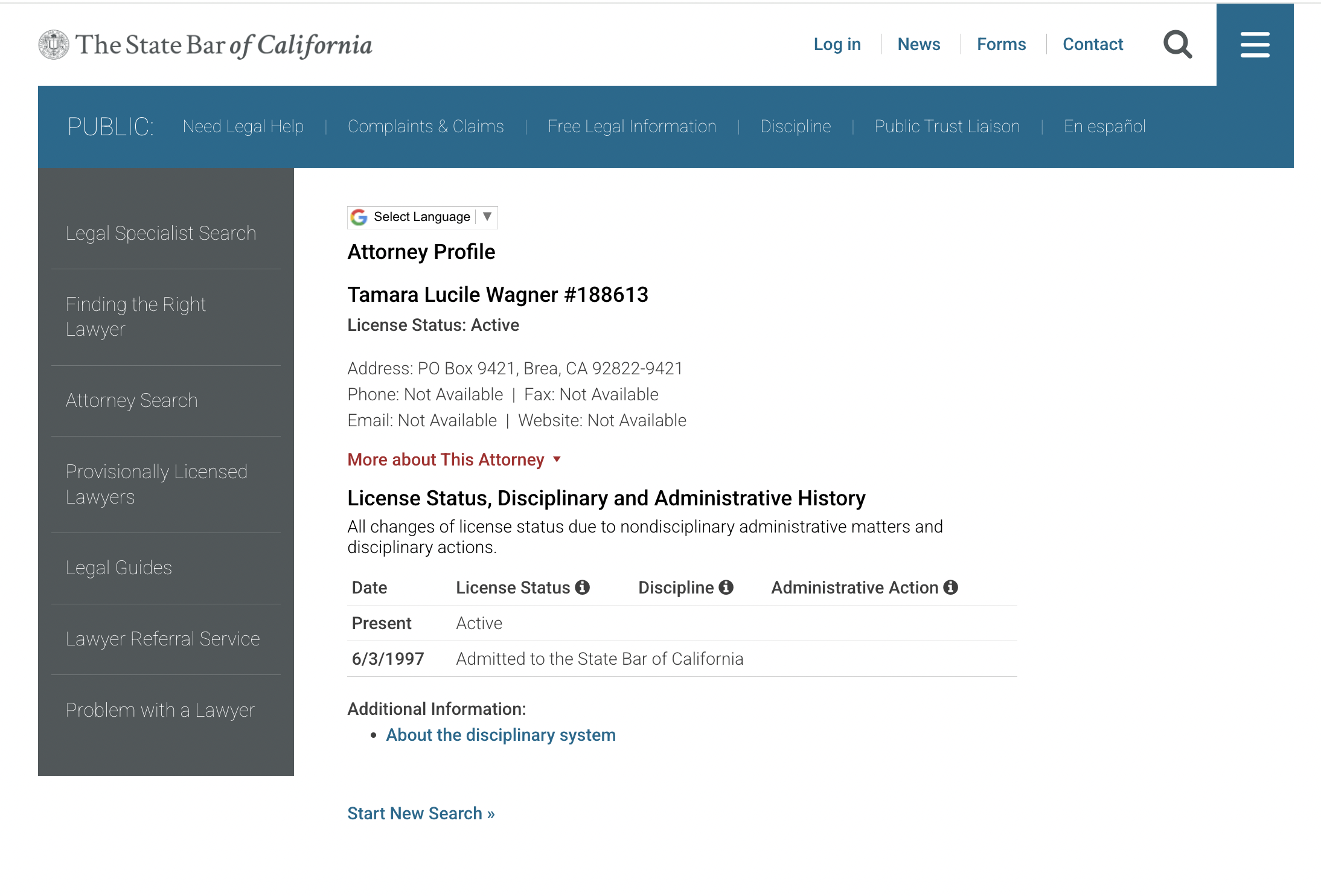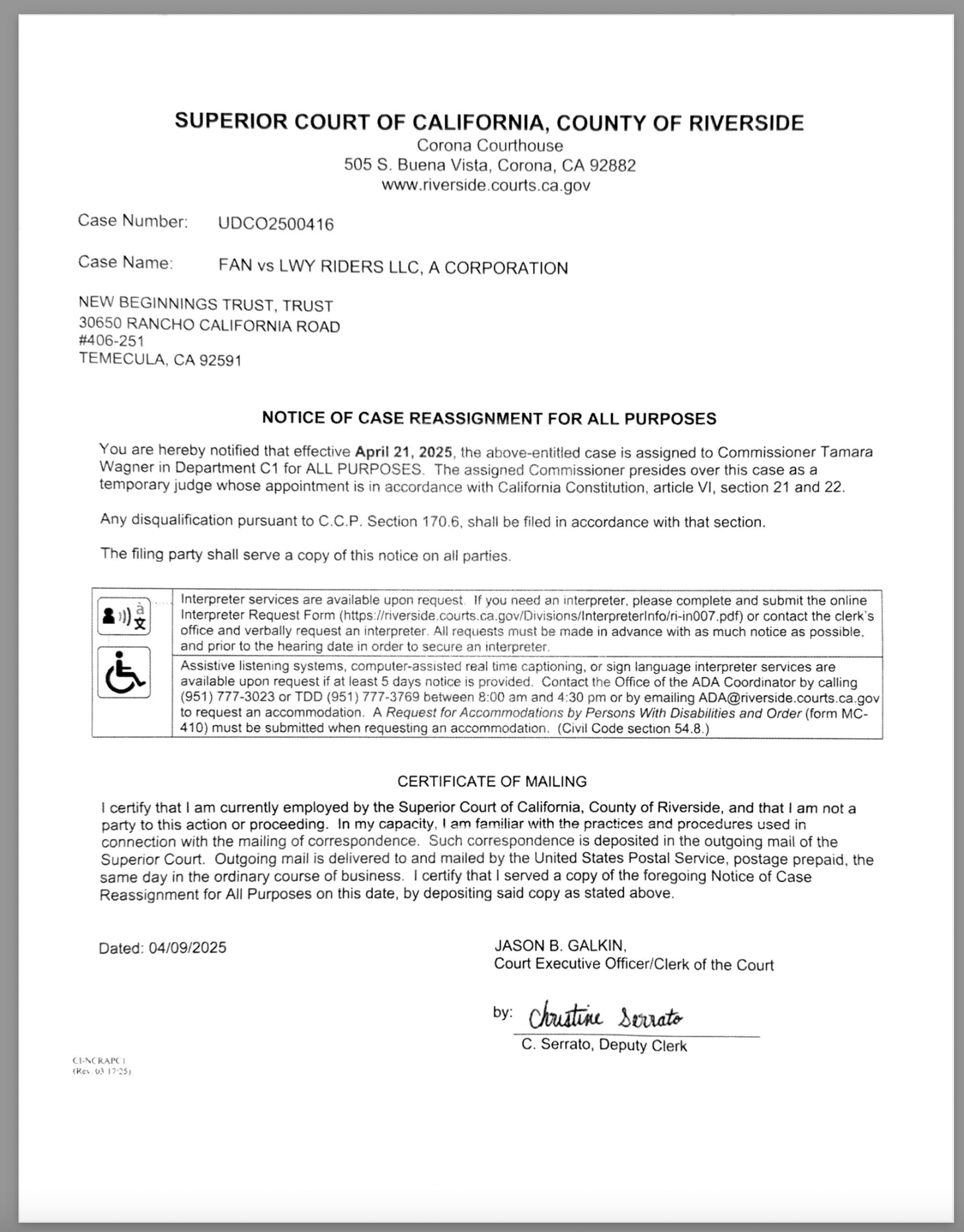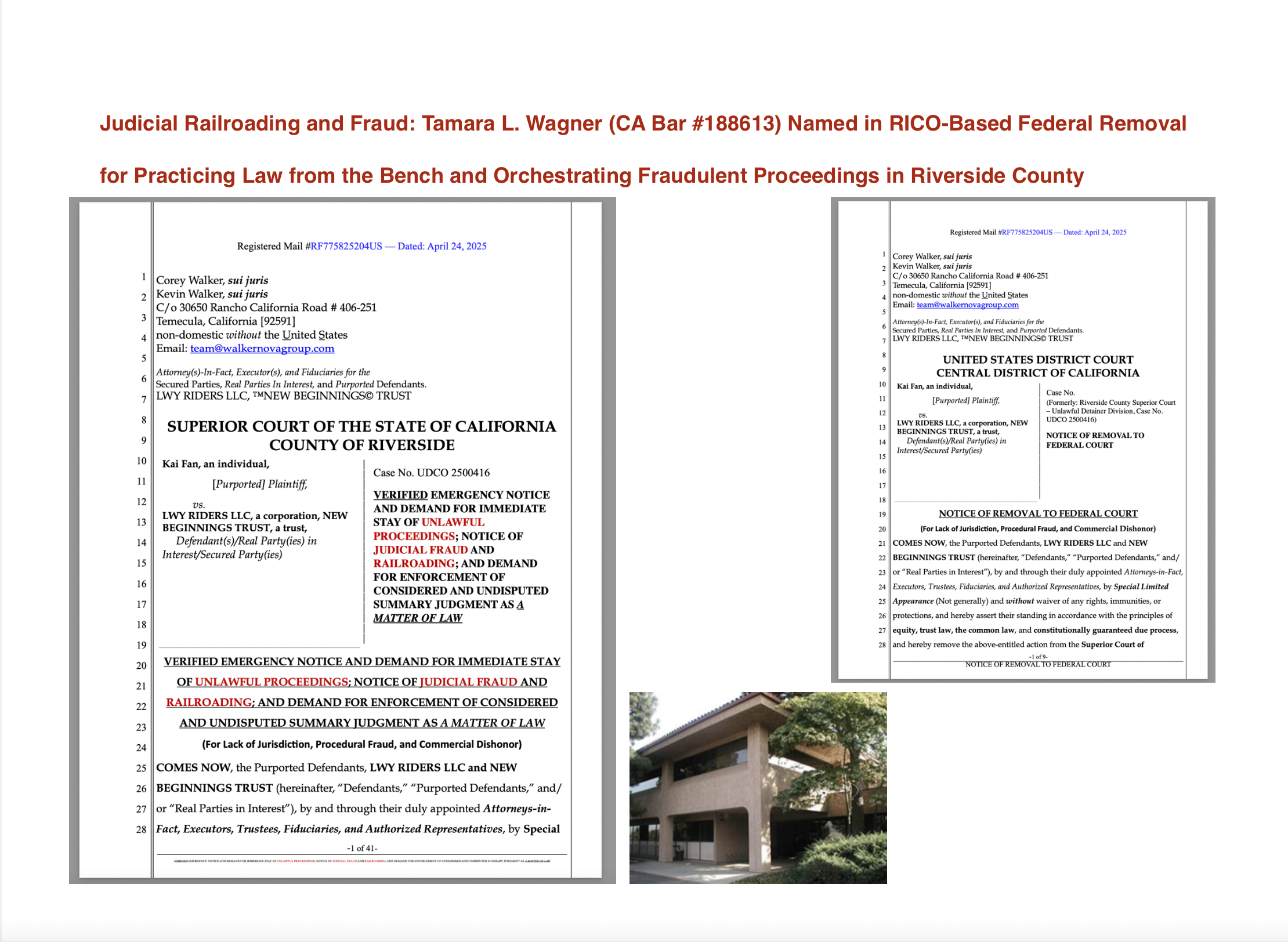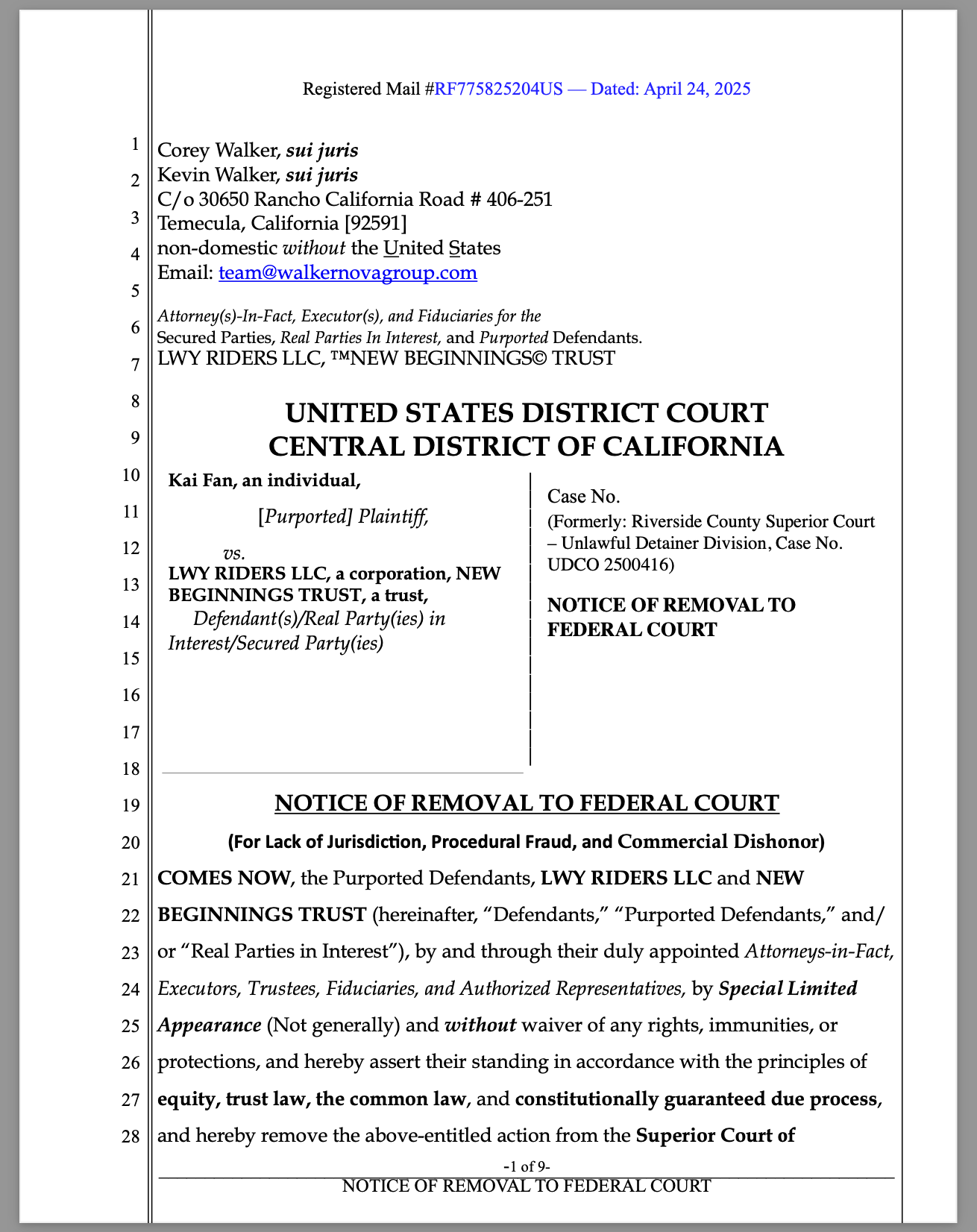Tamara L. Wagner (CA Bar #188613), a licensed attorney acting as a judicial officer in Riverside County, is now at the center of a federal removal action citing judicial fraud, civil rights violations, and RICO conspiracy. Defendants allege she is unlawfully practicing law from the bench without constitutional authority, advancing proceedings in open dishonor. Verified affidavits, UCC filings, and summary judgment demands were ignored, leading to claims of railroading and systemic court corruption. The case, removed under 28 U.S.C. §§ 1441, 1443, and 1446, is now pending in federal court.
🚨 Judicial Railroading & Fraud in Riverside County
Tamara L. Wagner (CA Bar #188613) Named in RICO-Based Federal Removal for Practicing Law from the Bench
The Case That Exposed a Cartel of Courtroom Corruption in California
In a bold legal maneuver now gaining national traction, LWY RIDERS LLC and NEW BEGINNINGS TRUST have filed a Notice of Removal to the United States District Court. The filing, backed by federal statutes and verified exhibits, accuses Tamara Lucile Wagner, an active California-licensed attorney (Bar Profile Link: https://apps.calbar.ca.gov/attorney/Licensee/Detail/188613), of engaging in judicial fraud, conspiracy, procedural dishonor, commercial trespass, and civil racketeering while presiding over proceedings in Riverside County Superior Court.

Judicial Railroading and Fraud: Tamara L. Wagner (CA Bar #188613) Named in RICO-Based Federal Removal for Practicing Law from the Bench and Orchestrating Fraudulent Proceedings in Riverside County

Judicial Railroading and Fraud: Tamara L. Wagner (CA Bar #188613) Named in RICO-Based Federal Removal for Practicing Law from the Bench and Orchestrating Fraudulent Proceedings in Riverside County
🛑 A Commissioner Posing as a Judge
Despite presenting herself as a judicial officer, Tamara L. Wagner (CA Bar #188613) is not a constitutionally appointed judge. According to the California State Bar, Wagner is a licensed attorney and commissioner — not an Article III or Article VI judge. Yet, she continues to practice law from the bench, issuing rulings, advancing proceedings, and attempting to preside over a quiet title dispute without lawful judicial authority or a binding oath of office.
This conduct is now being lawfully challenged as a violation of:
-
Canon 3 of the Code of Judicial Conduct,
-
Article VI, § 1 of the California Constitution, and
-
federal civil rights law, including 42 U.S.C. § 1983, and 18 U.S.C. §§ 241, 242 (criminal conspiracy and deprivation of rights under color of law).
📄 Unrebutted Filings Ignored: Summary Judgment Denied
On April 7, 2025, Defendants submitted verified affidavits, commercial filings, and demands for summary judgment (see Exhibit O) under UCC §§ 3-505, 3-603, and CCP § 437c. These documents—served via Registered Mail—were ignored by the state court, which failed to docket, hear, or honor the unrebutted facts on record.
By law, unrebutted affidavits stand as truth in commerce. The court’s silence constitutes dishonor, and its decision to proceed despite lack of jurisdiction or evidence is not merely negligent—it is constructive fraud.
🚂 Judicial Railroading in Action
With no verified complaint, no proper service of process, no standing, and no jurisdiction, the court nonetheless set the matter for trial—a textbook case of judicial railroading. Advancing a trial in the face of perfected, unrebutted affidavits and lawful objections not only violates federal due process—it constitutes actionable fraud upon the court (Hazel-Atlas Glass Co. v. Hartford-Empire Co., 322 U.S. 238).
The Defendants allege that Wagner’s conduct is part of a pattern and practice within Riverside County where judicial officers collude with corporate plaintiffs and court clerks to operate what has now been called a “courtroom cartel”—one that engages in mail fraud, administrative railroading, and commercial theft of trust-held property.
⚖️ Federal Response: RICO, Civil Rights, and Removal
On April 24, 2025, the Real Parties in Interest removed the action to the U.S. District Court for the Central District of California under:
-
28 U.S.C. § 1441 – Federal question jurisdiction
-
28 U.S.C. § 1443 – Denial of federally protected rights
-
28 U.S.C. § 1446 – Timely removal
-
42 U.S.C. § 1983 – Civil rights violations
-
18 U.S.C. §§ 241–242 – Criminal conspiracy and rights deprivation
-
18 U.S.C. § 1962 – Civil RICO (Racketeer Influenced and Corrupt Organizations Act)
These statutes apply due to a clear record of procedural abuse, refusal to recognize perfected filings, and the unauthorized legal actions by Tamara L. Wagner acting ultra vires—outside her lawful capacity.
🛡️ What’s at Stake: Trust Property, Sovereignty, and Due Process
This is more than a civil dispute—it is a direct confrontation between private trust estate sovereignty and a rogue administrative judiciary operating in violation of state and federal law.
At the heart of the case is 1a property lawfully conveyed to a private trust, secured by UCC-1 filings, a recorded Grant Deed, and unrebutted affidavits. Yet the state court, without authority, continues to facilitate what Defendants call a “racketeering campaign to strip beneficiaries of lawful title and secured equity.”
📢 What Happens Next
With removal perfected, the state court is divested of jurisdiction. The case is now under review by a proper Article III federal court, where allegations of:
-
Judicial fraud,
-
Unauthorized practice of law,
-
Procedural railroading, and
-
Civil RICO violations
will be addressed on the federal record.
For official source reference on Tamara L. Wagner’s license, visit:
👉 https://apps.calbar.ca.gov/attorney/Licensee/Detail/188613






